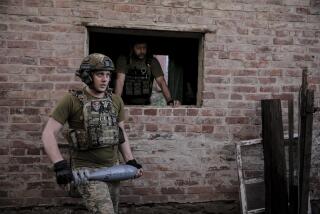More Aid for Russia Reforms Seen as Political Risk
WASHINGTON — The turmoil in Russia’s economy after years of Western-backed reform has so shaken the international development community that its entire approach to aiding Moscow has become an open question.
Amid signs that billions of dollars in international aid have been squandered in Russia, some experts in the private sector are questioning whether it is still politically possible for the United States and other Western governments to provide new public money to help underwrite Moscow’s economic transition.
Equally significant, some believe that events in Russia signal a major blow to the “Washington consensus,” a school of economic thought popular within the Clinton administration and international lending institutions based here. The approach calls on nascent free-market economies to allow capital to flow freely while reining in government spending and inflation.
The Russian government took these goals so seriously that it frequently stopped paying workers in order to meet them--one of several moves that eventually undermined popular support for reforms. What remained of that support unraveled in August after devaluation of the ruble and a freeze on foreign debt payments deepened the current economic crisis.
Any step back from the Washington consensus would mark a fundamental shift in post-Cold War thinking among U.S. policymaking elites, who have held out stringent fiscal discipline as the path to success for Europe’s post-Communist countries making the transition to capitalism as well as for the emerging economies of Asia.
The debate has largely drowned out any new grand ideas from Western experts who have influenced the course of economic change in Russia since the collapse of communism there seven years ago.
“There is a kind of intellectual morass in the United States on this issue,” said Arnold Horelick, director of Russian and Eurasian studies at the Washington-based Carnegie Endowment for International Peace. “For those who feel Russia is important, there is a dilemma: They believe it’s important to help, but they don’t know what to do.”
Distractions have also sapped the West of leadership at a key time. The scandal enveloping President Clinton has consumed Washington for months. And Germany’s longtime ruler, Chancellor Helmut Kohl--who arguably knows Russia and its president, Boris N. Yeltsin, better than any other Western leader--lost a reelection campaign.
But even with strong, experienced leadership, the West’s response to the financial crisis would have been slow, Russia specialists argue, because there are few easy answers amid the debris of Russia’s initial experiment with free-market capitalism.
“I don’t think you can stand around and wring your hands, but there’s not a lot they [the Clinton administration] can do until Russia sorts out its own direction,” said Arthur Hartman, a former U.S. ambassador to Moscow. “People are led to believe we have a lot more power than we really do.”
Even longtime critics of Washington-style reform measures admit that there are few obvious alternatives.
“It’s difficult to decide what a new policy should be,” acknowledged one critic, George Washington University political scientist Peter Reddaway.
Reddaway characterizes the administration’s Russia policy as fatally flawed in several respects, including what he calls “unthinking, uncritical” support for Yeltsin and a reform strategy that Reddaway says ignored Russia’s unique history and culture.
Despite the debacle in Russia, senior administration officials still defend their policies.
“What has happened is not a failure to pursue the right strategy or policies, but a failure in the strength of the [Russian] government to get those policies through,” said one senior White House official who declined to be identified by name.
“There was nothing radically Western” about the policies, the official continued. “In some ways, it was basic arithmetic. An attempt to change tax policy ran into the buzz saw of [Moscow’s] relations with [Russia’s other] regions. That’s not West versus Russia; it was center versus the regions.”
In the wake of Russia’s crisis, a growing number of U.S. analysts believe that it will be politically difficult to mount new initiatives for Moscow that require significant amounts of public money. There is now evidence to indicate that at least some of the billions of dollars in foreign aid aimed at supporting reforms was either wasted or stolen.
“We have checked a fair proportion of the loans, and I am ashamed to say that several billion dollars has not been used for its intended purpose--and some of it was simply stolen,” Russia’s chief auditor, Venyamin Sokolov, told a BBC interviewer in late September.
Stephen Kotkin, director of Russian studies at Princeton University, believes that the United States should continue to fund programs that keep Russia’s nuclear arsenal secure and its scientists working. However, he argues, Washington should not back Russia’s civilian reform efforts at all because of the endemic corruption.
“Congress won’t swallow it, and people will get angry--and rightfully so,” he said.
Kotkin contended that private, direct foreign investment--targeted at specific industries or regions and bypassing Moscow--offers the best chance because it could revive the country from the grass roots. Western industrialists invested in Josef Stalin’s Soviet Union when there was money to be made, and they will do it again for the same reason, Kotkin said.
According to the U.S.-Russia Business Council, there has been no discernible flight from Russia of U.S. investment.
Last month, international financier George Soros launched an $80-million program using private money to protect Russian media organizations whose future is endangered by the financial chaos.
More to Read
Sign up for Essential California
The most important California stories and recommendations in your inbox every morning.
You may occasionally receive promotional content from the Los Angeles Times.










